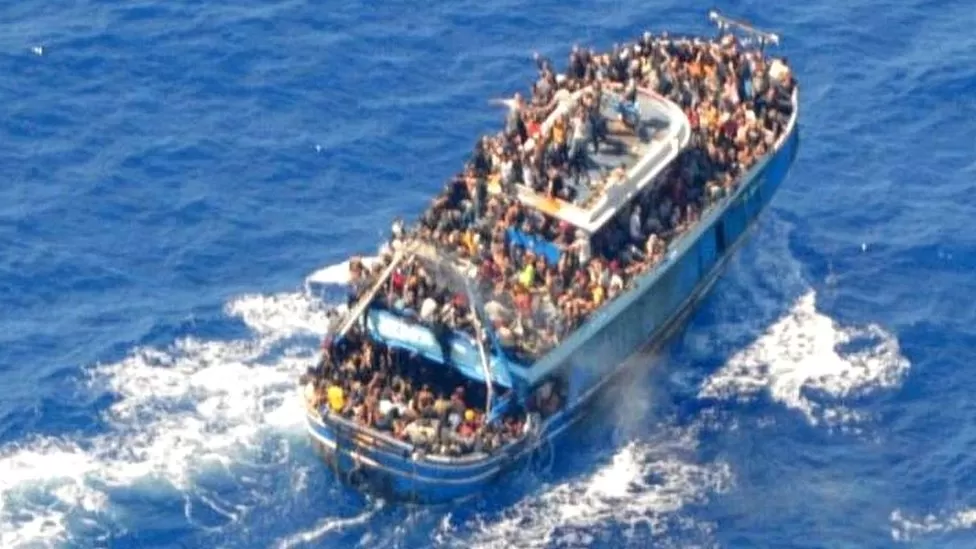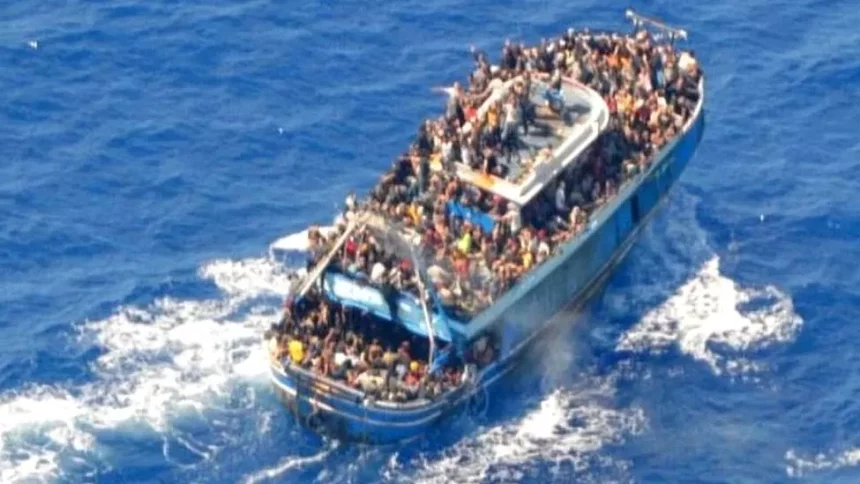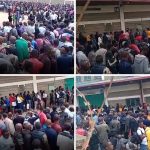Greek officials have denied a series of reports that suggest a migrant boat capsized 50 miles off the south coast because a rope was attached by coastguards.
So far 78 people are confirmed dead but hundreds more are feared missing, including as many as 100 children. The coastguard said initially it had kept a “discreet distance”. But a government spokesman now says a rope was used when the coastguard approached the fishing boat.
Ilias Siakantaris told Greek TV that a few hours before the boat went down the coastguard had “used a rope to steady themselves, to approach, to see if they wanted any help”. But he stressed: “There was no mooring rope,” suggesting that there was no attempt to tow the boat or tether to it for any length of time.
“They refused it, they said ‘no help, we go to Italy’ and continued on their way.”
The question of whether any of the ships tried to attach a rope to the migrant boat was first raised by an activist who said people on board had said they feared it could prompt their highly crowded boat to turn over.
A total of 104 people were saved from the sea soon after the ship sank shortly after 02:00 local time on Wednesday but the chances of finding any more are disappearing fast.
The UN International Organization for Migration has described the sinking as one of the biggest tragedies in the Mediterranean.

The coastguard’s timeline and account have been challenged, notably by one organisation that says it was in contact with people on the fishing boat. An email sent by Alarm Phone on Tuesday afternoon warned the coastguard that as many as 750 people were on board and they were urgently asking for help.
The coastguard has stressed that from the first moment it was in contact with the crew during the afternoon no request for assistance was made. Two commercial ships provided the boat with water during the evening, but coastguard officials have said repeated offers of assistance were turned down.
The Greek government’s insistence that no mooring rope was used follows a report by Greek newspaper Kathimerini on Friday that a coastguard vessel turned on searchlights and used loudspeakers to tell those on board they were in danger and would not be able to reach the Italian coast.
This was said to have taken place around three hours before the boat went down.
Members of the coastguard tied a rope to the fishing boat so that its own crew could check conditions inside, according to the source. Some of those on board then untied the rope in order to continue their route northwards to Italy.
But two accounts from survivors have suggested a rope may have led to the boat going down.
One has come from a local councillor in the port city of Kalamata who had earlier spoken to a 24-year-old Syrian.
“The coastguard boat tied them with some rope and tried to tow them to the left. For an unknown reason the boat veered to the right and suddenly sank,” said Tasos Polychronopoulos.
Another survivor gave a similar version to former Prime Minister Alexis Tsipras during a visit to Kalamata on Thursday.
“The Greek coastguard asked the vessel to follow them, but they couldn’t,” a translator told Mr Tsipras. “The coastguard then threw a rope but because they didn’t know how to pull the rope, the vessel started dangling right and left.”
“The coastguard boat was going too fast but the vessel was already dangling to the left, and that’s how it sank.”
Hellenic coastguard spokesman Cpt Nikos Alexiou was adamant on Friday that “there was no attempt to moor the boat”, although he did say ropes had been thrown by sailors from a commercial ship that provided supplies during the evening.
“Since the ship had not asked for help, we could not intervene,” he told public broadcaster ERT. “You cannot enter international waters if a vessel is not engaged in smuggling or some other crime,”
“The boat was illegally transporting people. We had not entered the critical phase to be able to enable the rescue operation,” he said.
Nine people, including several Egyptians, have been arrested on suspicion of people trafficking, Greek TV is reporting.
Georgios Vasilakos, a volunteer rescue doctor for the Hellenic Red Cross, told the BBC’s Today programme that no women and children were among the survivors.
He said survivors reported that “all women and children were isolated below deck”.
“This is why, because of the rapid unfolding of events and the rapid capsizing of the boat, they were unable to get out in time,” he said.
People on the boat had been drinking sea water for at least two days before it sank, he said.
Families of some of the missing have arrived in Kalamata in search of their loved ones.
“My relatives were on the boat,” said Aftab, who had travelled from the UK and said at least four of his relatives from Pakistan were unaccounted for.
A Syrian man from the Netherlands broke down as he revealed his wife and brother-in-law were missing.
“The authorities are looking for their bodies in the sea…They’re looking in hospitals, they’re looking among dead bodies, and among the survivors,” Kassam Abozeed said.
Several marches in protest at the tragedy took place on Thursday evening, in the capital Athens, the second city Thessaloniki and elsewhere.
Greece is one of the main routes into the European Union for refugees and migrants from the Middle East, Asia and Africa.
Last month the Greek government came under international criticism over video reportedly showed the forceful expulsion of migrants who were set adrift at sea.



